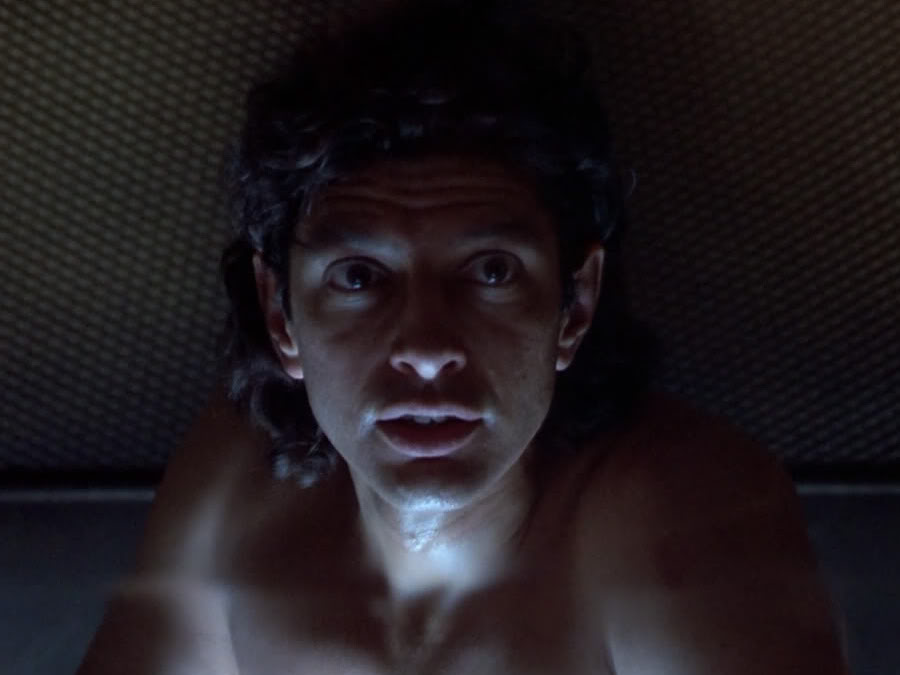
A brilliant but eccentric scientist begins to transform into a giant man/fly hybrid after one of his experiments goes horribly wrong.
EN
“‘A deep, penetrating dive into the plasma pool,’ also one of the decade’s great romantic tragedies and the most harrowing portrait of the visceral indignities of disease and aging since Pialat’s The Mouth Agape. Megalomania, fear and madness are stages the genius passes through in a pop Gothicism that brings out the cerebral Cronenberg’s operatic side. The fantasy of transformation is answered by “general cellular chaos and revolution,” sex and sugar are the newfound appetites that mold the tumorous chrysalis. The bloodied paw on the steamy glass, bristles out of the wound, the writhing larva in the delivery room. Bergman’s Hour of the Wolf for the protagonist up the wall, with the poignancy of Goldblum’s twitchy pantomime radiating through layers of goo. “I’m saying, I’m an insect who dreamt he was a man and loved it. But now the dream is over, and the insect is awake.” The climax reveals the inspired variant of The Hunchback of Notre Dame, the stinger is cinema’s most sorrowful splatter effect.”
Fernando F. Croce1
“To me the film is a metaphor for ageing, a compression of any love affair that goes to the end of one of the lover’s lives. I can be a sucker for a romantic story, believe it or not. I’m not totally cynical. Nor do I think I’m pessimistic. But the reality is undeniable, especially if you don’t believe in the afterlife – where you walk hand in hand through the clouds together. Every love story must end tragically. One of the lovers dies, or both of them die together. That’s tragic. It’s the end.
[...]
When you have a dream that has terrified you, and you can’t shake the fear, you tell somebody the dream. As it comes out of your mouth you know it’s flat, it’s not working. You’re saying exactly what happened, but the terror isn’t there. You can tell by the look on the person’s face that it’s not scary. You’re saying, ‘But you had to be there. The dream had a tone and a colour and an ambience that was terrifying. It wasn’t the concept. It wasn’t the action. It was the dream itself that was terrifying.’ That’s the thing. It’s the tone. Intangible. And yet it’s palpable, in the sense that you wake up and you’re still living in it. You’re not in the narrative any more, but the half-life is still there. I had a dream that I was watching a film and the film was causing me to grow old fast. The movie itself was infecting me, giving me a disease, the essence of which was that I was ageing. Then the screen became a mirror in which I was seeing myself age. I woke up terrified. That’s really what I’m talking about, more than any puny virus.”
David Cronenberg2
FR
« The Fly est a la fois un film tragique (l’irréversibilité du mouvement de transformation) et serein : le spectacle dérisoire de l’organe quittant son corps (« Rien de plus inutile qu’un organe », hurlait Artaud). Entre ce mouvement d’acceptation (« j’ai été cela ») et de refus (’horreur du devenir), Cronenberg réitére la grande question de son cinéma: ou finit l’organe (celui du corps humain) et ot commence l’organisme (celui de la mouche) et inversement ? Entre les deux, il navigue à vue sur les rives incertaines du documentaire type sciences naturelles (du Painlevé : la vie des insectes, leur façon de se nourrir, comme dans l’ouverture de L’Age d’or de Bunuel) et l’image scientifique médicale (l’image moléculaire de la composition du corps grace à l’ordinateur). »
Charles Tesson1
- 1Charles Tesson, « Les yeux plus gros que le ventre, » Cahiers du Cinéma, no. 391, Janvier 1987.

